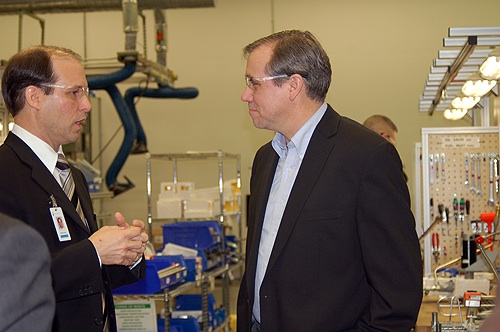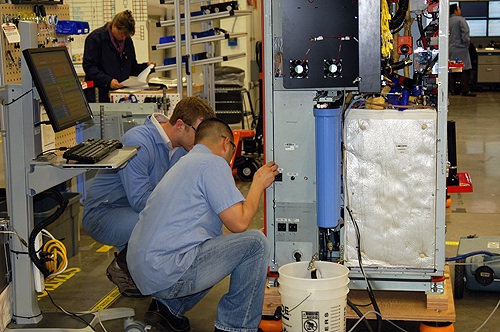 Just $10 million. That’s all the CEO of ClearEdge Power told Senator Jeff Merkley that he needs to transform the Hillsboro fuel cell manufacturer into a billion dollar company. The CEO, Russ Ford, guided Merkley through the ClearEdge plant on Tuesday, showing him a wall ready to be torn down and an assembly line ready to be extended. The renovations could boost capacity from 1,500 units a year to more than 10,000.
Just $10 million. That’s all the CEO of ClearEdge Power told Senator Jeff Merkley that he needs to transform the Hillsboro fuel cell manufacturer into a billion dollar company. The CEO, Russ Ford, guided Merkley through the ClearEdge plant on Tuesday, showing him a wall ready to be torn down and an assembly line ready to be extended. The renovations could boost capacity from 1,500 units a year to more than 10,000.
By Corey Paul
Just $10 million. That’s all the CEO of ClearEdge Power told Senator Jeff Merkley that he needs to transform the Hillsboro fuel cell manufacturer into a billion dollar company. The CEO, Russ Ford, guided Merkley through the ClearEdge plant on Tuesday, showing him a wall ready to be torn down and an assembly line ready to be extended. The renovations could boost capacity from 1,500 units a year to more than 10,000.
If, that is, people will buy enough fuel cells.
And Ford thinks they will. What’s more, Ford expects ClearEdge to have an initial public offering in the second half of 2012. And if that happens, the company could be the first to go public with an IPO in Oregon since 2004 (depending on what happens with IPOs involving Tripwire and Erickson Air-Crane).
 But it will require solid sales, Ford says. This will be ClearEdge’s first full calendar year supporting itself without relying on venture capital. It has raised about $90 million total. The company also will need continued governmental support, Ford says, which is exactly what he and other executives asked from Merkley at a company meeting Tuesday morning.
But it will require solid sales, Ford says. This will be ClearEdge’s first full calendar year supporting itself without relying on venture capital. It has raised about $90 million total. The company also will need continued governmental support, Ford says, which is exactly what he and other executives asked from Merkley at a company meeting Tuesday morning.
Merkley (pictured at left with Ford, photo courtesy ClearEdge) has made into signature issues the creation of green jobs and reduction of foreign oil imports. The senator also supported offering financial incentives to buyers of energy-efficient technology like fuel cells. Right now, the government offers a $5,000 tax credit for residential applications and a $15,000 credit for commercial ones.
Since 2009, ClearEdge has grown from about 35 to 210 employees, and it plans on surpassing 300 by the end of the year. “And these are high-tech kinds of jobs that will stay here for a long time,” Ford says. On Tuesday, Merkley saw those blue-coated workers assembling the devices. He also heard how they work from the vice president of research and development.
 |
ClearEdge employees building fuel cells. Photo courtesy ClearEdge. |
The gist is this: Natural gas pumps into a device about the size of a refrigerator. That device draws out hydrogen, and through an electrochemical reaction with oxygen, it generates up to 5 kW of power per hour. That’s enough to power a small business, school or large house — all of which the company targets.
Before Merkley, all of the Congressional representatives in the state had paid a visit and praised ClearEdge’s economic and environmental promise. During his turn, Merkley said the company represented a niche market and a technology that’s ahead of the world curve, though he was unfamiliar with their financial structure.
Ford says the devices nearly halve monthly utility bills and through those savings, pay themselves off in four or five years, faster than solar or wind energy. The company expects to earn $60 million in sales in 2011.
But upfront, fuel cells cost a lot: up to $56,000. Which is why ClearEdge wants the government to offer tax credits to encourage people to buy enough fuel cells to lower their price through an economy of scale.
Korea has bought the most ClearEdge units, signing a $40 million, three-year deal last June to distribute 800 fuel cells to multi-tenant housing. That deal stemmed from a Korean mandate that 10 percent of the energy needs for new buildings must come from renewable sources as it tries to become less dependent on nuclear power. Domestically, California is the biggest consumer, with higher energy rates and a $12,500 state tax incentive — on top of the federal one. Oregon has no such incentive, but ClearEdge does benefit from the business energy tax credit (BETC).
Just a few weeks ago, the Oregonian published a series that questioned whether the state’s green energy incentives — like the BETC — translate into jobs for the state and attract companies that wouldn’t otherwise come. An IPO from ClearEdge would likely be seen as some validation for the state’s expensive effort to brand itself as a green-energy state, an effort Merkley supports.
The senator adds that green energy is valuable for three reasons:
– It protects national security by lessening dependence on foreign oil
– It creates jobs
– It helps our environment with lower carbon emissions.
“So incentives have to be evaluated with those three important things in mind,” Merkley said. “And now we’re to the point where we can evaluate those incentives.”
Corey Paul is an associate writer for Oregon Business.

